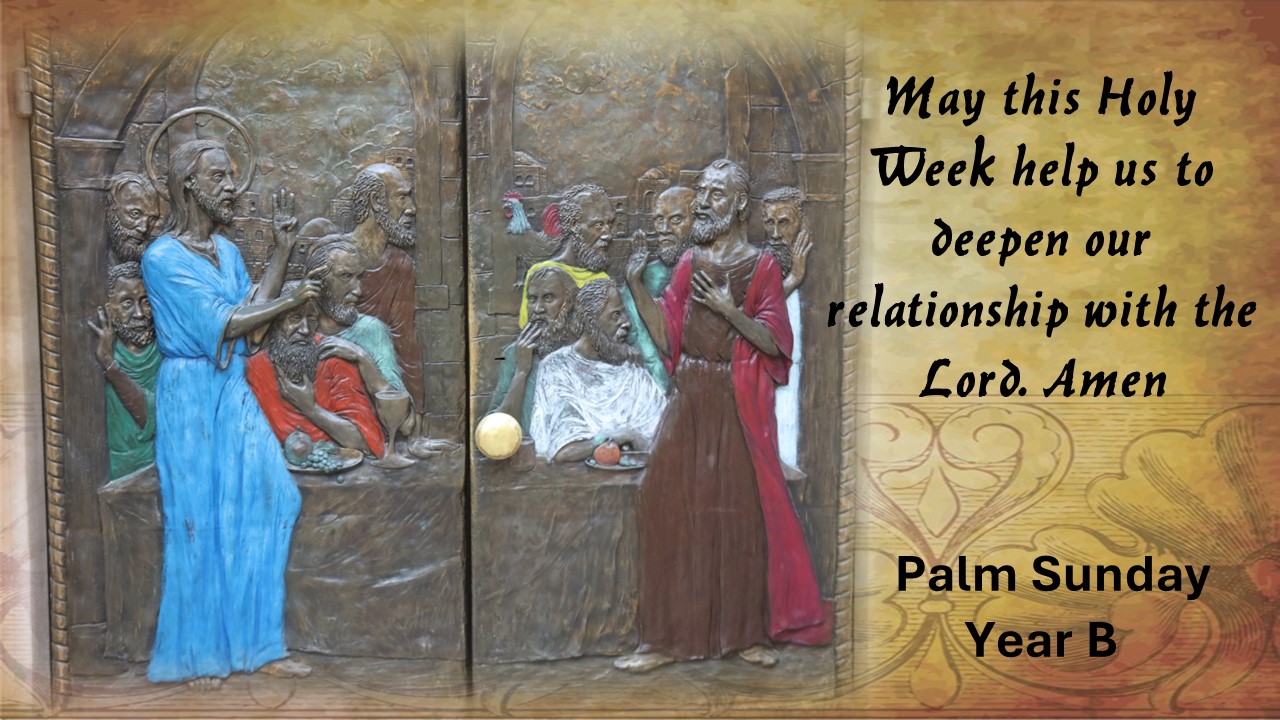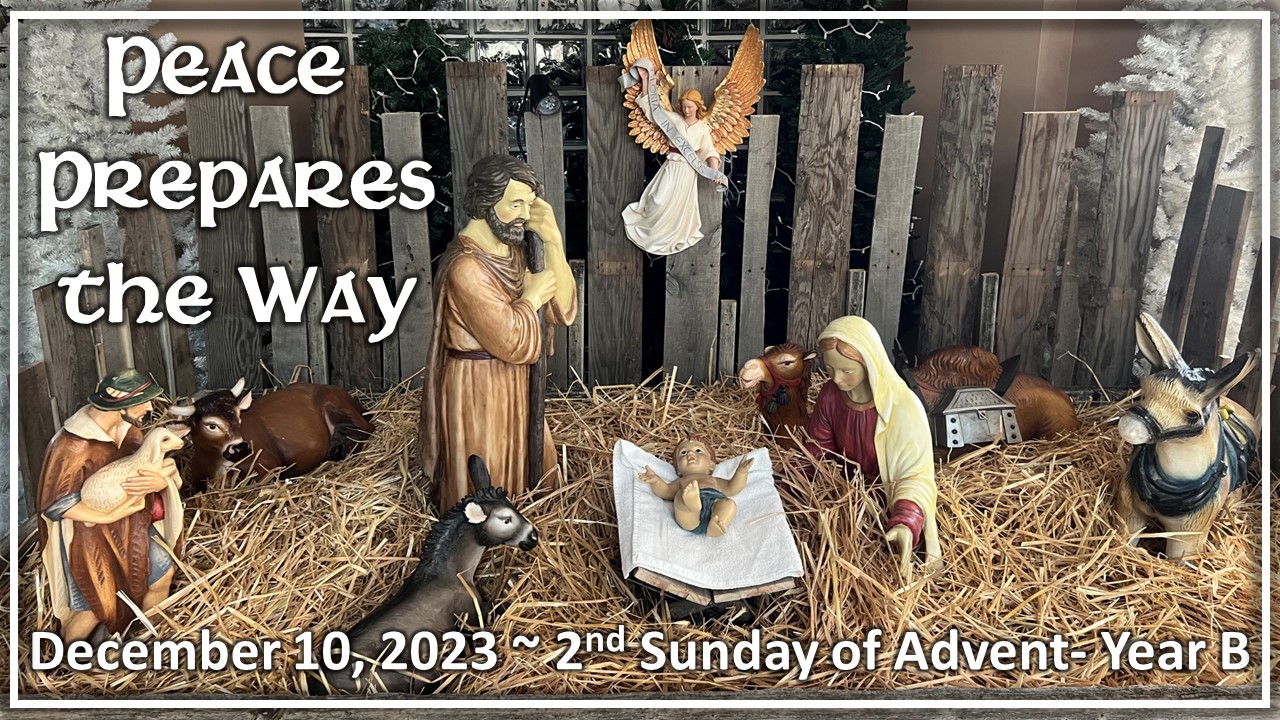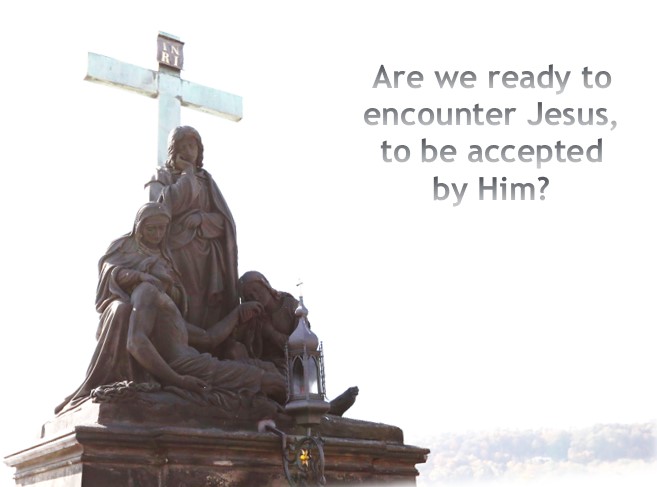
Palm Sunday – Year B ~ March 24, 2024
WHY THERE IS CONFUSION AND CONFLICT?
Today as we begin the holiest week of Lent which is the culmination of our Lenten Journey which we started on Ash Wednesday by receiving the ashes on our heads, everyone is invited to reflect and meditate on the Triumphant entry of Jesus to Jerusalem, and his passion, death, and resurrection. This entry of Jesus to Jerusalem is going to bring lot of conflict and confusion. Let me, before I explain the great mystery of Lord’s entry to Jerusalem, share a story with you. This I believe will really help us to understand and grasp the real meaning of the title. Let me share a story with you all to understand that confusion and conflict can cause lot of problems and one of them is not understanding other people.
Once a manager had a great team, but one employee in particular just had a bad attitude. This was an employee he inherited when he became manager. This employee was always negative, did not act as part of a team, and was arrogant in everyway. He talked to this employee to try and inspire and encourage, (including documenting this verbal warning), but after a short period of time, the employee fell back into his usual, ways. Only a few weeks after he spoke to the employee, a loud disagreement between this employee and another, happened on the main floor. It was loud enough to have people stop in their tracks wondering what was happening. He immediately went to the floor, and calmly asked each employee to stop by his office. He talked to them about how conflict in the workplace is unacceptable, gave a verbal warning for one of the employees, and a written warning to the employee with the bad attitude stating that if this behavior continues, suspension and or termination, would be the next step taken. These warnings were done separately, as not to embarrass each employee.
It was a bit of a shock to the employee with a bad attitude, that a written warning was given, however, he made it perfectly known, that this was not the first time they met because of this team-affecting behavior. he also was not quite as caring as he was at the first meeting. He took out the notes from the last meeting and went over what was discussed, including that a written warning would be given if the behavior continued. With this documentation, the employee had no choice but to accept the written warning.
That put a scare into the employee, who from that point on, had no more attitude issues. The employee’s personality and character stayed the same, but there were no more negative comments or further disruptions.
On this Palm Sunday we are going to experience the same kind of confusion and conflict and division is going to creep into people. Jesus every year as it was his custom have come to Jerusalem to celebrate the Passover however this last one has lot to teach us. Saint Andrew of Crete, bishop explains the mystery in this way: “Blessed is he who comes in the name of the Lord. Blessed is the king of Israel. Let us go together to meet Christ on the Mount of Olives. Today he returns from Bethany and proceeds of his own free will toward his holy and blessed passion, to consummate the mystery of our salvation. He who came down from heaven to raise us from the depths of sin, to raise us with himself, we are told in Scripture, above every sovereignty, authority, and power, and every other name that can be named, now comes of his own free will to make his journey to Jerusalem. He comes without pomp or ostentation. As the psalmist says: He will not dispute or raise his voice to make it heard in the streets. He will be meek and humble, and he will make his entry in simplicity”.
The world is divided into two with the entry of Jesus to Jerusalem. Why so? I believe this is the final moment of Jesus ‘life before he will be arrested, mocked, derided, beaten, crucified and die. Let us reflect first on the element of conflict. In Jerusalem, the conflict started right with the birth of Jesus as the whole Jerusalem was shocked and shaken to hear about a new king was born. This conflict cost of lives of little babies because the greed for power did not have the aspect of morality. This conflict grew stronger and stronger with the public ministry of Jesus. The leaders of the nation did not like what Jesus was doing and they always stood against him. But with the entry of Jesus to Jerusalem, conflict went up to its peak. The Gospel narrates that they plotted against him how to kill him as the Psalmist says, “For I hear the whispering of many – terror all around! – as they scheme together against me, as they plot to take my life” (Psalm 31:13). In this conflict not only the religious and political authorities are involved but also one of Jesus’ own disciples was the participant of this conflict and betrayed him and sold him for 30 coins. This conflict will continue till Jesus is crucified and died.
Now let us reflect on the element of confusion. It is joyful and sorrowful at the same time. We celebrate the Lord’s entrance into Jerusalem to the cries of his disciples who acclaim him as king. However, there is huge confusion going on among the people. People are shouting with great enthusiasm to welcome Jesus into the city of Jerusalem, maybe for two reasons; first they think Jesus is their king and secondly, he is going to deliver Jerusalem from the Roman oppression. But they are surprised nothing happened, and the confusion arose. In this poignant contrast, our hearts experience in some small measure what Jesus himself must have felt in his own heart that day, as he rejoiced with his friends and wept over Jerusalem. Was he aware of the confusion going on around him? There was a time when people pressing on him, he had no time to eat or rest. People shout for him “Son of David have mercy on us”. They requested him to heal their servants, sons, daughters and even to raise their brother from the dead. They left their homes to follow him and to listen to him. They are astounded and amazed at his teaching. Even when he entered to Jerusalem, they shouted for him “Hosanna, Hosanna, Blessed is he who comes in the name of the Lord…”. Then what led people to change their slogans from Hosanna to Crucify, Crucify?
In 2020 when I went to Israel to walk on the footsteps of our Lord, I could imagine how streets must be packed with people who came out to welcome Jesus. I wondered about the people who were following him leaving their homes and even forgetting to eat. There were people to lay their clothes on the ground, to carry the branches and shout Hosanna in the Highest, blessed is he who comes in the name of the Lord, Hosanna in the Highest. Now there is no voice heard, there is silence, dead silence. Even the words of Psalmist are going unnoticed:
“Lift up your heads, O gates! and be lifted, O ancient doors! that the King of glory may come in. Who is the King of glory? The LORD, strong and mighty, the LORD, mighty in battle. Lift your heads, O gates! and be lifted up, O ancient doors! that the King of glory may come in. Who is this King of glory?
The LORD of hosts, he is the King of glory” (Psalm 24:7-10).
Palm Sunday is a day where we all come together to rejoice in the Lord that he has taken the journey of our salvation as Prophet Zechariah says “Rejoice greatly, O daughter Zion! Shout aloud, O daughter Jerusalem! Lo, your king comes to you; triumphant and victorious is he, humble and riding on a donkey, on a colt, the foal of a donkey: (Zechariah 9:9). However, the confusion has gone so deep into the people that word Hosanna is being taken over by the slogan of Crucify him. This situation shows how evil can put us down and our voice of truth can be silenced. Every new day is bringing a message of disaster, discouragement, hopelessness, and stress.
In the midst of Conflict and Confusion let us remember that he is entering to Jerusalem to suffer and die for our sins so that we may have eternal life and life in abundance; “Sing and rejoice, O daughter Zion! For I will come and dwell in your midst, says the LORD. Many nations shall join themselves to the LORD on that day and shall be my people; and I will dwell in your midst. And you shall know that the LORD of hosts has sent me to you. The LORD will inherit Judah as his portion in the holy land and will again choose Jerusalem. Be silent, all people, before the LORD; for he has roused himself from his holy dwelling” (Zechariah 2:10-13).
Prophet Zephaniah encouraging us to rejoice in the Lord who has the power to restore everything back: “Sing aloud, O daughter Zion; shout, O Israel! Rejoice and exult with all your heart, O daughter Jerusalem! The LORD has taken away the judgments against you, he has turned away your enemies. The king of Israel, the LORD, is in your midst; you shall fear disaster no more on that day it shall be said to Jerusalem: Do not fear, O Zion; do not let your hands grow weak. The LORD, your God, is in your midst, a warrior who gives victory; he will rejoice over you with gladness, he will renew you in his love; he will exult over you with loud singing” (Zephaniah 3:14-17).
St. Andrew of Crete keep encouraging us; “Let us run to accompany him as he hastens toward Jerusalem, and imitate those who met him then, not by covering his path with garments, olive branches or palms, but by doing all we can to prostrate ourselves before him by being humble and by trying to live as he would wish. Then we shall be able to receive the Word at his coming, and God, whom no limits can contain, will be within us”.
In his humility Christ entered the dark regions of our fallen world and he is glad that he became so humble for our sake, glad that he came and lived among us and shared in our nature to raise us up again to himself. And even though we are told that he has now ascended above the highest heavens—the proof, surely, of his power and godhead—his love for man will never rest until he has raised our earthbound nature from glory to glory and made it one with his own in heaven.
So, let us spread before his feet, not garments or soulless olive branches, which delight the eye for a few hours and then wither, but ourselves, clothed in his grace, or rather, clothed completely in him. We who have been baptized into Christ must ourselves be the garments that we spread before him. Now that the crimson stains of our sins have been washed away in the saving waters of baptism and we have become white as pure wool, let us present the conqueror of death, not with mere branches of palms but with the real rewards of his victory. Let our souls take the place of the welcoming branches as we join today in the children’s holy song: Blessed is he who comes in the name of the Lord. Blessed is the king of Israel.
This conflict and confusion could be dispelled from our lives only if we help one another to understand the true meaning of Jesus ‘sacrifice. Jesus voluntarily took on the pain and abandonment of his passion and crucifixion so that he could be with us in whatever sorrow or difficulty we might be experiencing. Jesus “experienced abandonment in order not to leave us prey to despair, in order to stay at our side forever,” the Pope said during Palm Sunday Mass in St. Peter’s Square.
“He did this for me, for you,” he said, “because whenever you or I or anyone else seems pinned to the wall — and we have seen someone pinned to the wall — you see someone lost in a blind alley, plunged into the abyss of abandonment, sucked into a whirlwind of ‘whys’ without answer, there can still be some hope …”
Let me conclude my reflection with the following story by an unknown author who help us understand that God loved the world so he gave his only Begotten Son so that we may have eternal life.
There was once a bridge which spanned a large river. During most of the day, the bridge sat with its length running up and down the river paralleled with the banks, allowing ships to pass through freely on both sides of the bridge. But at certain times each day, a train would come along, and the bridge would be turned sideways across the river, allowing a train to cross it.
A switchman sat in a small shack on one side of the river where he operated the controls to turn the bridge and lock it into place as the train crossed. One evening as the switchman was waiting for the last train of the day to come, he looked off into the distance through the dimming twilight and caught sight of the train lights. He stepped to the control and waited until the train was within a prescribed distance when he was to turn the bridge. He turned the bridge into position, but, to his horror, he found the locking control did not work. If the bridge was not securely in position, it would wobble back and forth at the ends when the train came on to it, causing the train to jump the track and go crashing into the river. This would be a passenger train with many people aboard.
He left the bridge turned across the river, and hurried across the bridge to the other side of the river where there was a lever he could hold to operate the lock manually. He would have to hold the lever back firmly as the train crossed. He could hear the rumble of the train now, and he took hold of the lever and leaned backward to apply his weight to it, locking the bridge. He kept applying the pressure to keep the mechanism locked. Many lives depended on this man’s strength.
Then, coming across the bridge from the direction of his control shack, he heard a sound that made his blood run cold. “Daddy, where are you?” His four-year-old son was crossing the bridge to look for him. His first impulse was to cry out to the child, “Run! Run!” But the train was too close; the tiny legs would never make it across the bridge in time. The man almost left his lever to run and snatch up his son and carry him to safety.
But he realized that he could not get back to the lever. Either the people on the train or his little son must die. He took a moment to make his decision. The train sped safely and swiftly on its way, and no one aboard was even aware of the tiny broken body thrown mercilessly into the river by the onrushing train. Nor were they aware of the pitiful figure of the sobbing man, still clinging tightly to the locking lever long after the train had passed. They did not see him walking home more slowly than he had ever walked: to tell his wife how their son had brutally died.
Now if you comprehend the emotions which went through this man’s heart, you can begin to understand the feelings of our Father in Heaven when He sacrificed His Son to bridge the gap between us and eternal life. Can there be any wonder that He caused the earth to tremble and the skies to darken when His Son died? How does He feel when we speed along through life without giving a thought to what was done for us through Jesus Christ?
Are we confused to follow Jesus?
May this Holy Week help us to deepen our relationship with the Lord. Amen
Other Sermons In This Series

REFLECTION FOR ALL SUNDAYS ~ YEAR B ~ JULY, 2024
July 04, 2024

2nd Sunday of Advent- Year B ~ December 10, 2023
December 07, 2023

31st Sunday in Ordinary Time Year C ~ October 30, 2022
October 28, 2022

